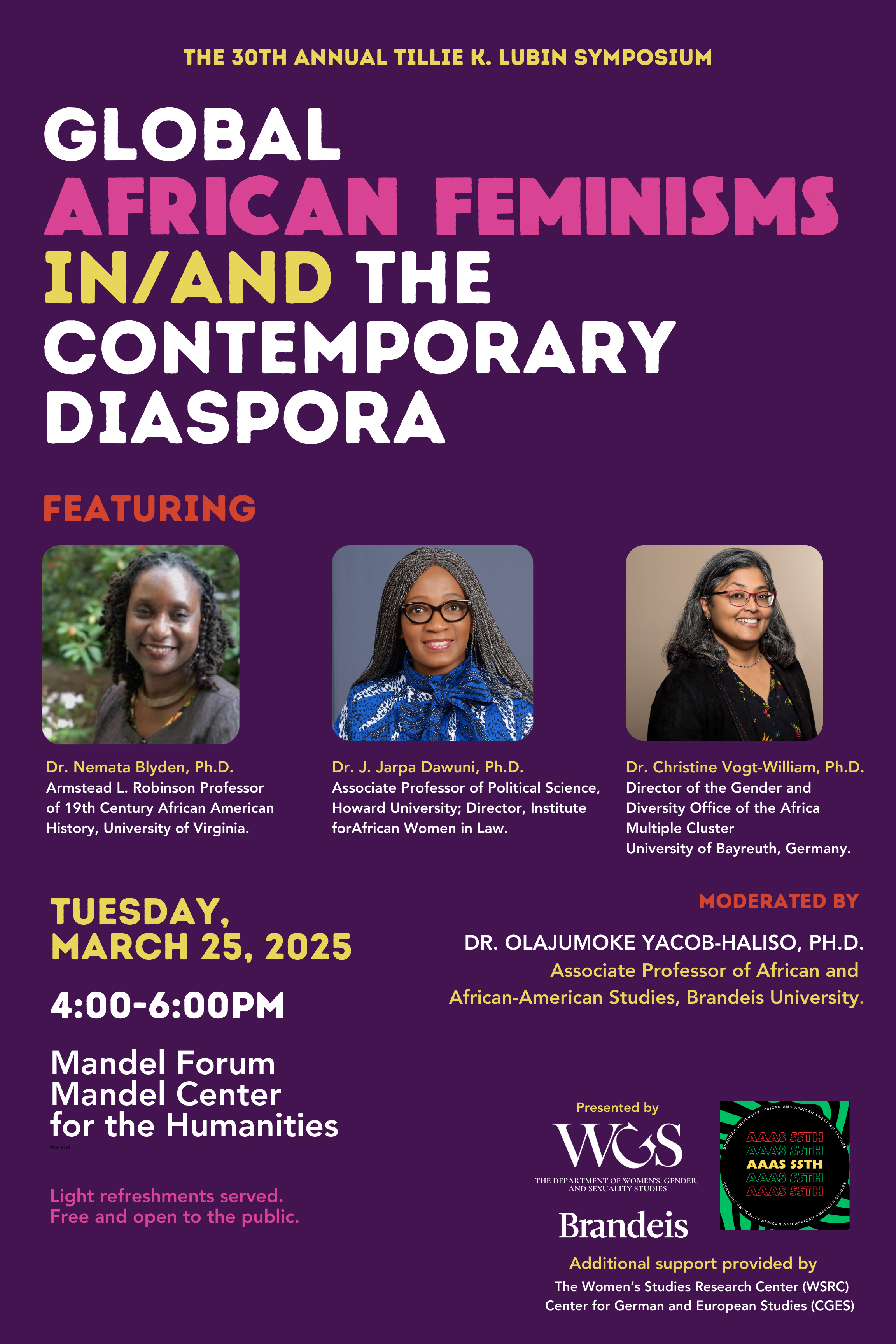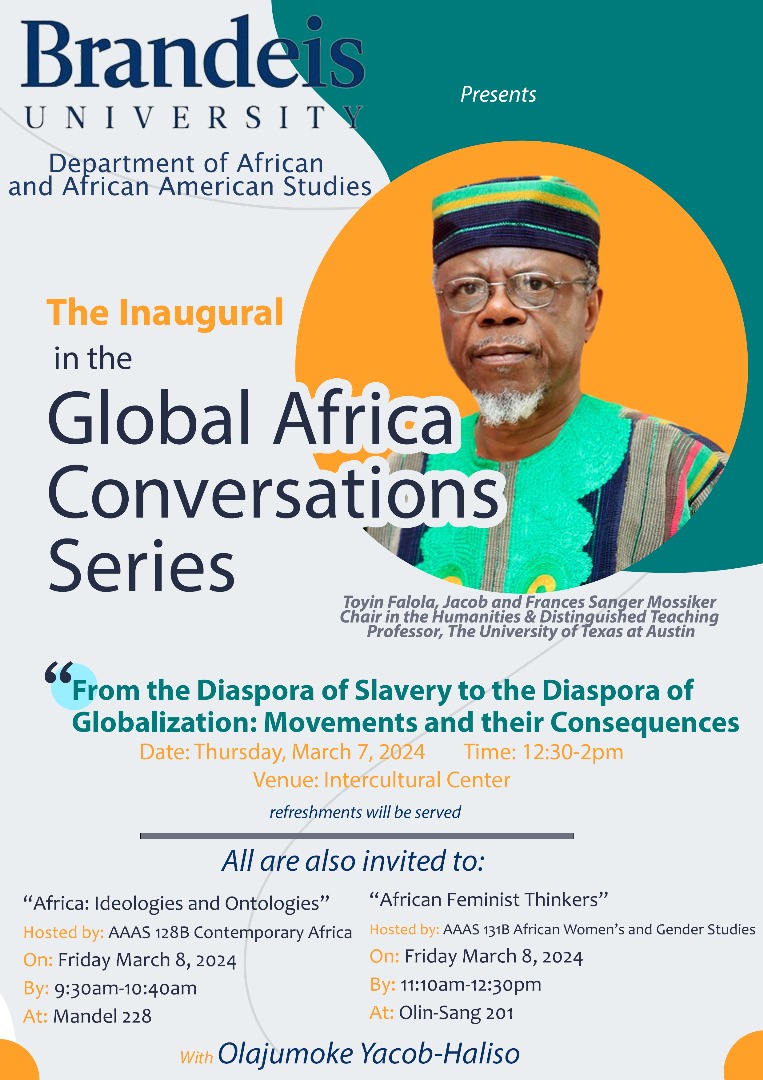Global Africa Conversations Series
What does it mean to read Africa from the global and the global from Africa? The central purpose of the transdisciplinary Global Africa Conversations series is to convene cutting-edge scholarship and ideas which interrogate the ontologies, epistemologies, methodologies, geographies, praxes, and imaginaries of centering Africa within policy and intellectual discourses of global salience and remit.
Essentially, this timely series of critical conversations reimagines what it means to consider the peoples, experiences and knowledges of Africa as the pivot for the understanding and resolution of major questions of global importance relating to development, social justice, knowledge production, gender equality, race and racism, climate change, peace, conflict and security, popular cultures, decolonization, migration, and globalization, to mention a few. It challenges received knowledges about Africa and probes the epistemological foundations of the disciplines of the humanities and the social sciences. It aims to recenter and reinscribe Africa in the humanities and social sciences, within studies of Africa and the African diaspora, and in the consideration of major global problems. This series shuns an essentialist conception of Africa and defines Africa in the broadest terms possible to include continental Africa, its islands, and peoples and cultures of African descent dispersed globally. It suggests that Africa’s participation, voice, and leadership are inimitable components of the global search for progress and a better future for all humanity.
The Global Africa Conversations series continues in the renowned critical inquiry and social justice traditions of Brandeis University and the African and African American Studies (AAAS) Department. This multi-modal series will regularly focus on the subjects and debates that animate global conversations and interdisciplinary studies, providing a forum for their discussion and disentanglement with reference to insights and perspectives from African Studies and its constitutive fields.
The series is hosted by the African and African American Studies (AAAS) Department at Brandeis University. Contact Dr Olajumoke Yacob-Haliso (olaj@brandeis.edu) for more information.
Events
2025
March 25th, 2025, Mandel Forum
Global African Feminisms in/and the Contemporary Diaspora
The Tillie K. Lubin Symposium Department of Women’s, Gender, and Sexuality Studies (WGS), Brandeis University
In partnership with: Department of African and African American Studies (AAAS), Centre for German and European Studies (CGES), & Women’s Studies Research Centre (WSRC)
African feminisms are multiple, transnational, dynamic, politically charged and historically situated. How have these characteristics shaped African feminist knowledges, identities, pedagogies, policies, and activism, especially in varied diaspora contexts? In what ways have these global and particular interactions between African feminisms and feminisms elsewhere and their specific international contexts shaped the way we understand, teach and research about women and gender in Africa? What are the subjects, theories and praxis that animate the intercourse of these feminisms and their movements? Where are the intersections and where are the divergencies? How does a changing world and its progressively counter-democratic ideologies and trajectories impact how we theorize gender and feminisms of Africa and the diaspora?
Across Africa, Europe, the United States and the rest of the world, the increasing ascension of right-wing ultra-nationalist governments and neofascist ideologies of control, alongside rising anti-woman, anti-LGBTQ, anti-feminist, anti-Black, anti-African, anti-democratic, misogynist and neo-masculinist socio-political movements have challenged all feminisms, modulated their progress, and provoked a rethinking of strategies. That this would be so for transnational African feminist identities, research, and praxis has been understudied and understated. Africa’s large and global diaspora experience these trends in particular ways, compelling scholars to rethink their frameworks for making sense of Africa and Africans’ continued progress both on the geographic space of the continent and in its/their multiple locations.
This year’s Tillie K. Lubin Symposium considers the above questions, debates and dilemmas from diverse, intersectional and inclusive standpoints. It aims to provide the platform for making enduring connections between African feminisms and the multiple feminisms of the African diaspora, and elsewhere. It considers the structures and processes that have produced change and stasis over time in the theorization and performance of African feminisms, as well as the complicated identities produced by these processes and their international iterations. The expert perspectives of the invited leading gender studies scholars from diverse and multiple national, institutional, and disciplinary backgrounds draws on their varied research, institutional service, and diverse experiences to provide a map for how we think about global African feminisms in our diaspora context in the US, Europe, and far beyond.
This year, the Lubin Symposium and WGSS are delighted to partner with the Centre for German and European Studies (CGES), the Women’s Studies Research Centre (WSRC), and the African and African American Studies (AAAS) Department’s Global Africa Series.

Symposium Speakers
Professor J. Jarpa Dawuni is a lawyer, social entrepreneur, feminist scholar, Associate Professor of political science at Howard University, and the director of the Institute for African Women in Law. She was the founding Director of the Howard University Center for Women, Gender, and Global Leadership established in 2020. Her primary areas of research include judicial politics, women in the legal professions, gender and the law, international human rights, women’s civil society organizing, and democratization. Dr Dawuni has held several global competitive fellowships, including as a two-time Fulbright Specialist Scholar, a Fellow of the Salzburg Global Fellowship in Austria, a Fellow of the Stellenbosch Institute for Advanced Studies (STIAS) in South Africa, and a Fellow of the French Institute for Advanced Studies at IMERA (Marseille, France). In 2016, she received the President Obama White House Presidential Award. She is the Principal Investigator (PI) of a National Science Foundation (NSF) grant for a study on Comparative Demographic Variation in Judiciaries, which explores the representation of Black and Afro-descendant women judges in eight countries. A widely published author with over five books, an award-winning leader, and a dedicated mentor. She loves gardening.
Professor Christine Vogt-Williams
Professor Vogt-William is the Director of the Gender and Diversity Office with the Africa Multiple Cluster (funded by the German Research Council) at the University of Bayreuth. Originally from Singapore, Christine Vogt-William studied English, German and Psychology at the University of Essen, Germany. She completed her doctoral thesis at the Centre for Women’s Studies at the University of York, England as a Marie Curie Gender Graduate Fellow. She is the author of Bridges, Borders and Bodies: Transgressive Transculturality in Contemporary South Asian Diasporic Women’s Novels (2014) and is co-editor of Disturbing Bodies (2008), an essay collection on artistic and literary representations of “deviant” bodies. She has published on South Asian and African diasporic and mixed race literatures, queer and critical race approaches to Tolkien’s works, literary representations of transracial adoption and transnational surrogacy in postcolonial women’s writing. She is a guest editor of a special issue on ‘Shame in Anglophone Literatures’ for the European Journal of English Studies.
Professor Vogt-William was a Visiting Scholar at the Department of Women’s Studies at Emory University, Atlanta, Georgia, USA from 2008 to 2010. She has taught in the Postcolonial and North American Studies departments at the universities of Münster, Freiburg and Frankfurt am Main. Vogt-William was Interim Professor for Postcolonial and Gender Studies at the English and American Studies Department, Humboldt University, Berlin from 2014 to 2017, where she taught literary and cultural studies. She is currently working on her second book on cultural representations of biological twinship in Anglophone literatures. Email: Christine.Vogt-William@uni-bayreuth.de
Professor Nemata Blyden (M.Phil., Ph.D. Yale University) is the Armstead Robinson Professor of 19th Century African American History at the Carter G. Woodson Institute, University of Virginia. A scholar specializing in African American, African Diaspora, and African history, Nemata Blyden is the author of African Americans and Africa: A New History (Yale University Press, 2019), and West Indians in West Africa, 1808-1880: A diaspora in reverse (University of Rochester Press, 2000). Among her publications are “‘Back to Africa’ The Migration of New World Blacks to Sierra Leone and Liberia”, in Organization of American Historians Magazine of History, Volume 18, Number 3 (April 2004); “The search for Anna Erskine: African American Women in Nineteenth-Century Liberia” in Catherine Higgs, Barbara Moss & Earline Rae Ferguson, Stepping Forward: Black women in Africa and the Americas (Ohio University Press, 2002); “Between Africa and America: Recalibrating Black Americans' Relationship to the Diaspora, with Dr. Jeannette Eileen Jones, Perspectives on History, September 2020, Volume 58, Issue 6; “This na true story of our history”: South Carolina in Sierra Leone's historical memory” in Atlantic Studies: Global Currents, Volume 12, Issue 3, 2015. Her principal thematic interests have included nineteenth century African American history, African and American and Caribbean migrations to Africa and African American engagement with Africa. Professor Blyden was a consultant for In Motion: The African American Migration Experience for the Schomburg Center for Research in Black Culture (New York) and is a CoPI for “To Enter Africa from America”: The United States, Africa, and the New Imperialism, 1847-1919 with Jeannette Eileen Jones (PI), Nadia Nurhussein, and John Cullen Gruesser.
Moderated by: Dr Olajumoke Yacob-Haliso
Dr Olajumoke Yacob-Haliso is Associate Professor of African and African American Studies at Brandeis University and currently Vice-President of the International Studies Association (ISA). Her interdisciplinary research bestrides Women’s and Gender Studies, International Relations, Refugee and Forced Migration Studies, Political Science, and African Studies. Dr Yacob-Haliso has held many distinguished fellowships including from the American Council of Learned Societies, the Harry Frank Guggenheim Foundation, the United Nations University for Peace Africa Program, and more. She has published several books including the three-volume Palgrave Handbook of African Women’s Studies (Palgrave, 2021), Gendering Knowledge in Africa and the African Diaspora: Contesting History and Power (Routledge, 2017) and African Refugees (Indiana University Press, 2023).
About the Tillie K. Lubin Symposium
The Tillie K. Lubin Symposium focuses on a contemporary issue or event relevant to Women’s, Gender and Sexuality Studies. The series is named after Tillie (Kulp) Lubin by Sara Lee Schupf, who served on the Women's Studies Program Board in the 1990s and endowed the Lubin Symposium in her mother's honor. This year, the Lubin Symposium, as it has done for many years now, centres the renowned critical inquiry and social justice traditions of WGSS and Brandeis University, and is delighted to partner with the Centre for German and European Studies (CGES), the Women’s Studies Research Centre (WSRC), and the African and African American Studies (AAAS) Department’s Global Africa Series.
2024
March 7th, 2024, Intercultural Push Lounge
“From the Diaspora of Slavery to the Diaspora of Globalization: Movements and their Consequences”
